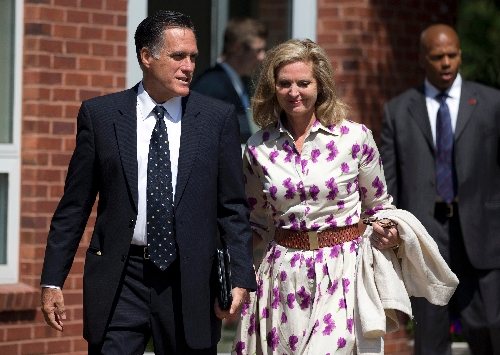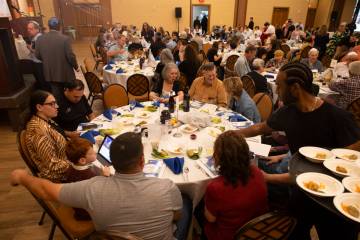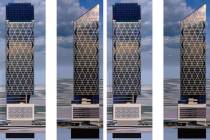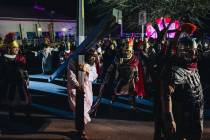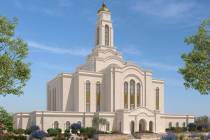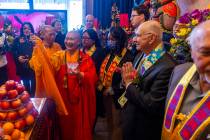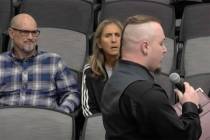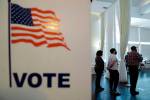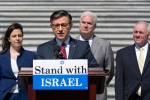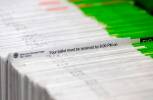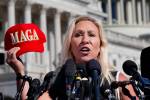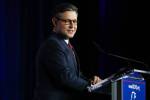Mormon voters lean toward Romney, regardless of party affiliation
CHARLOTTE, N.C. - When it comes to the Mormon vote, it appears GOP presidential nominee Mitt Romney has it all but wrapped up in Nevada and the nation even before the Nov. 6 election.
As a prominent member of the Church of Jesus Christ of Latter-day Saints, Romney is the U.S.-founded religion's first real hope to win the White House. As a Republican, his conservative views on fiscal and social issues align more with church teachings of modesty and self-reliance. And as a candidate, he attracts a loyal LDS contingent of volunteers and supporters who are working hard to elect him.
Despite that advantage, U.S. Sen. Harry Reid, the most prominent Democratic Mormon politician in Nevada, on Tuesday urged LDS members to vote for President Barack Obama and to side with Democrats, who he argued help the poor and middle class more than the GOP.
Reid made the plea on the sidelines of the Democratic National Convention, asking Mormons in his party to get more involved during a unique event with Utah Mormon Democrats, who launched a caucus last year to attract more voters to their party. "I'm a Democrat because I am a Mormon," Reid said, repeating a favorite line to make the case that his party is more in line with church teachings.
Reid said it's not that unusual for a Mormon to run for president. The LDS founder, Joseph Smith, ran for the White House in 1844 as a progressive who wanted to end slavery, the senator recalled. And Jon Huntsman, a Republican Mormon dropped out of the GOP race earlier this year, Reid noted.
"But a presidential election is not about religion. It's about values," Reid said, addressing more than 200 people at a hotel near the Times Warner Cable Arena, where the convention is being held. "Barack Obama I'm supporting because he shares my values."
Reid said those values include compassion, opportunity and fairness so all Americans can prosper, not just the rich. The senator asked Mormons to work hard until Election Day and to tell their neighbors, friends and fellow churchgoers to vote for Obama.
"Be proud of who you are," Reid said in his 10-minute speech. "Don't back down."
Reid's wife, Landra, accompanied the senator. She is battling breast cancer and has recently begun making public appearances. Her hair was short and pure white, but she said she is feeling stronger. "I feel fine," she said. "I feel fine."
The couple became Mormons as adults, after they met. They've been married 53 years , Reid said.
In Nevada, Mormons make up about
7 percent of the population of 2.7 million people, constituting a fairly small but reliable set of voters who are taught by their church to be active in the community, politically and otherwise.
The Mormon vote helped propel Romney to easy victories in Nevada's GOP presidential caucuses in 2008 and 2012. In both cases, he won about half the total vote, with 25 percent of the GOP caucus-goers identifying themselves as LDS members in exit polls. Those same polls showed Romney winning more than
90 percent of Mormon voters who participated in the party affairs.
Romney also has the political and religious advantage over Obama in a general election because most Mormons are registered Republicans, according to estimates in Nevada and across the United States. Obama describes himself as a Christian but isn't affiliated with a church.
Of the 6 million Mormons in the United States, fewer than one in five is a registered Democrat, said Craig Janis, a Utah delegate and head of that state's LDS caucus. More than three out of five are registered Republicans - for a three-to-one advantage over Democrats - while the rest are registered as nonpartisan or with third parties, he said.
Janis said Romney appears to be "a solid Mormon," and he and other church members are excited by the idea that an LDS member has risen high enough in politics to run for president - and possibly to win.
"But I just couldn't bring myself to vote for him," Janis said of Romney. "I don't think the Republicans' message - the kind of thing that greed is good and that's idealized by Paul Ryan - goes well with Mormon ideals. The Democratic message of helping the community and coming together is more compatible with my faith."
Ryan, a conservative congressman from Wisconsin, has authored a GOP budget that would slash federal spending across the board, including for social welfare programs that Democrats defend as a safety net for the poor in hard times.
The LDS Democratic caucus in Utah has 2,000 members and is the largest political caucus in the state after only one year. Janis said he has been getting queries from across the nation from Mormon Democrats who want to start their own state caucuses.
He said many Mormon Democrats face discrimination from other Christian groups, particularly evangelicals, who favor Republicans. The harshest critics call the Mormon religion a cult.
"The Republican Party - bigotry is a strong word - but they still have some issues with Mormons, especially evangelicals," Janis said. "Democrats couldn't care less that Harry Reid is a Mormon. I can't think of one instance where it's even come up politically."
The view from Romney supporters in the LDS community couldn't be more different.
West Allen, a Las Vegas lawyer, was a Republican alternate delegate at last week's GOP national convention in Tampa. He said the GOP has constitution-based principles that ensure a healthier society and a stronger America. The Democratic Party, in his view, has lost its way, expanding government into a welfare program that saps people of their drive to take care of themselves and others.
"Today, the Democratic Party has been replaced with a form of modern progressivism that is increasingly irreligious and dependent on Washington, D.C. - a Democratic Party that deems America's motto 'In God we trust' to be antiquated, and instead prefers the more secular version 'In Government we trust,' " Allen said. "The majority of members of the LDS church, just as within other Christian denominations, recognize the failures of a centralized government approach to fixing America's problems."
Allen said communities, churches and families "are generally more adept at remedying social maladies" than are "bureaucrats in Washington, D.C."
"Nevada's LDS community, that includes many Hispanics, simply understands that large federal government and increased deficit spending does not create the jobs we need to fix our economic crisis," Allen said. "Families and free enterprise will."
Quin Monson, director of the Center for the Study of Elections and Democracy at Brigham Young University, said there is little evidence Obama could peel many Mormon votes, regardless of political affiliation, away from the former Massachusetts governor.
Monson has studied LDS Democrats in Utah, and his organization surveyed their views. The survey, posted at www.utahdatapoints.com, found that
23 percent of Utah Democrats had a favorable impression of Romney. But a much larger 42 percent of the state's Mormon Democrats liked him. Obama's job performance rating among Utah Republicans was only 5 percent.
"It is very unlikely that Mormon Republicans will be persuaded to vote for Barack Obama," Monson said. "A lot of Mormon Democrats seem to have an affinity for Mitt Romney, but it's unclear whether that translates to votes or not. Certainly, more Mormon Democrats will vote for Mitt Romney than Mormon Republicans will vote for President Obama."



